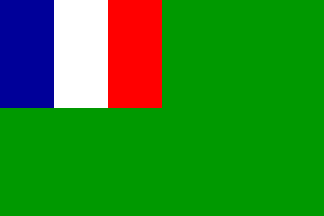
 byJoseph McMillan
byJoseph McMillan
Last modified: 2004-12-29 by joe mcmillan
Keywords: counani | cunani | guiana | star (white) | tricolor |
Links: FOTW homepage |
search |
disclaimer and copyright |
write us |
mirrors
Someone asked what was the flag of Cunani, which formed an independent (?)
republic south of Cayenne in present-day French Guyana. This republic was
established in current Brazilian territory. The capital was the little town of
Cunani. The flag was red with a vertical black band at hoist.
Jaume Ollé, 23 March 1998
Cunani is on the northern coast of the current Brazilian state of Amapá. The
flag discribed by Jaume is very similar to the current flag of the not-so-neighbouring state of
Paraíba. Just a coincidence?
António Martins, 2 April 1998
The following history is drawn primarily from Bruno Fuligni, L'Etat c'est moi (1997), chapter 7 (Les Républiques amazoniennes), pp. 133-145.
On 8 July 1888, the Gros family left Vanves (near Paris) for Calais, Southampton, Barbados, and Counani, capital city of the "Republic of Independent Guiana (Guyane indépendante). Jules Gros, who only knew this country from books, had been president-for-life of the republic for two years. He was an little known writer and journalist, member of the French Société de Géographie, when in 1883 he met M. Franconie, who was deputy for Cayenne (French Guiana) in the French National Assembly. Franconie asked Gros to be the secretary of a lobby to promote the economy of French Guiana. That is the way he met Jean Ferréol Guigues, who said he was an explorer and that he had just came back from Dutch and French Guiana, where he said he had discovered gold mines. With a Swiss friend, Paul Quartier, he formed a company, of which Gros became the secretary, and thanks to subscriptions, discovered that it was easier to become rich by collecting money from investors than by looking for gold in Guyana.
Back in Guiana, Guigues and Quartier spent the money they got in France and settled in Counani, a village on the coast between the estuaries of the Oyapock and Araguary Rivers, which was founded in 1788 by Jesuits. The chief of Counani was known as Captain Trajane. The village, like those of Carsevenne, Cachipour, Ouassa, Rocaoua, Couripi, and Amapá, had a black population that wished to be administered by France (where slavery had been abolished) rather than by Brazil.
In fact, there had been a problem with this region since the 1713 Treaty of Utrecht. The eighth article of the treaty is unclear, talking of "Japoc", which the Brazilians said to be the Oyapock, but which the French said only means "river" in Indian languages. (Vincent Yanez Pinçon, quoted in the Utrecht treaty, gave this name to another river, the Araguary.) The other treaties all referred back to the Utrecht treaty, and the status of the region between the two rivers remained unclear. There were discussions between France and Brazil in 1841 and 1856 without result, and nothing more after 1867--the Amazon having become legally an international river, the Oyapock and Araguary were of no more interest to France.
Let's come back to Captain Trajane. Brazil wanted to affirm its sovereignty
over Counani and supported there a rebellion against Trajane. Trajane asked
France to protect Counani, but France did not think it was worth having
problems with Brazil. That is the reason why Trajane began having problems
with the population of Counani. His lieutenant was Nunato de Marced, whose
daughter married Paul Quartier, who suggested to his father-in-law to
let the area of Counani become an independent state. Quartier and Guigues hoped that
they would be able to sell stock in the non-existent gold mines of Counani in France and
get more money if they could control such a puppet state. The republic was proclaimed
on 23 July 1886 with Guigues as
President of the Council and Quartier as minister for public works.
Olivier Touzeau, 26 April 2001
Guigues came back to Paris, but his lack of discretion raised the attention
of the French Government, which stated in its Journal Officiel on
11 September 1887
that there had been a modus vivendi between France and Brazil since 1862 about
this territory, and that nobody could say there was a Republic of Counani.
Guigues said Gros was responsible for everything, that there was no more president,
and affirmed that Counani was only a free colony, asking for the protection
of France.
Olivier Touzeau, 26 April 2001
Fuligni writes exactly: "The new state [...] flies a strange flag mixing
French and Brazilian colors: green with French tricolor in the canton."
Olivier Touzeau, 20 August 2002
Gros, disappointed by this decision, wanted the Counani Republic to stay alive, and for "his" state to be sovereign.
So Gros drew a new flag, red and black, with, in the center, a white five-pointed star. (According to Bruno Fuligni, the flag was made, and was not just an imaginary one.) At the same time, Quartier, still in Counani, had been banned and Trajane, who did not want independence, regained some influence.
Is this the end of the Republic? No! In January 1888, Gros and Guigues were again together for Counani, because some English businessmen, who did not know much about the story, agreed to found the Guiana Syndicate Ltd. and to give money to our Counanians for the exploitation, during 99 years, of the soil, infrastructures and about everything in the territory of the republic territory. The most important man